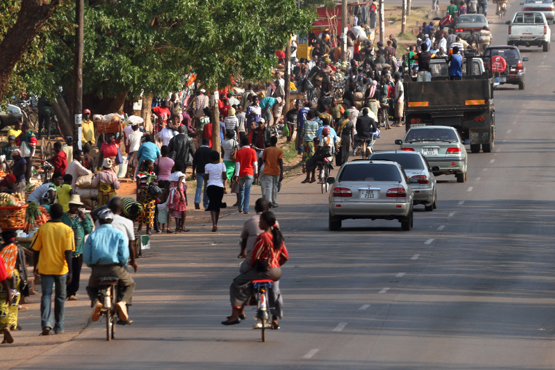New Lancet Commission calls for action to tackle threats to young people’s health and wellbeing, supported by the FIA Foundation

The second Lancet Commission on adolescent health and wellbeing has called for swifter action for safe, supportive environments for young people, including safer roads, which is supported by the FIA Foundation.
Road traffic injury remains the leading cause of death for older adolescents, and a major conclusion of the Commission was a call for safe environments.
New analysis indicates that without targeted action by 2030 at least half of the world’s adolescents (over 1 billion) will still live in countries where they are at risk of experiencing poor health across many indicators, including mental health and overweight. Over the past decade, progress in adolescent health and wellbeing has been mixed and uneven. Adolescents in low- and middle-income countries represent over a quarter of the. population and bear a disproportionate share of the global disease burden (9.1%) – yet receive just 2.4% of global development aid.
The World Resources Institute (WRI) authored a road safety section, which was supported by the FIA Foundation and Deputy Director Avi Silverman was a Commissioner of the study. The report highlights the need for a ‘safe system’ approach to road safety to ensure young people are kept safe on the roads. In particular it emphasises the need for investment in safe road infrastructure and action on speed including in school areas. Such measures can improve safety for vulnerable road users and encourage walking and cycling bringing environmental and health benefits as well as reducing road traffic injury, the report says.
The Commission highlights that current funding for adolescent health and wellbeing is not proportionate with the magnitude of the challenge nor targeted to areas of greatest need.
An analysis of funding undertaken by the Commission finds adolescent health and wellbeing makes up only 2.4% of global aid, despite adolescents being 25% of the world population and making up 9% of the total burden of disease. The Commission’s analyses of the returns on investments in adolescence show they are on par with investments in children aged 0–9 years, and that investments in children and adolescents are associated with better returns than investments in adults. The Commission’s exploration of the challenges facing the field of adolescent health suggest that investment is hampered by the absence of global and national leadership, governance and accountability for adolescent health and wellbeing, among many other factors.
This is the first global Commission to prioritise and embed meaningful adolescent and youth engagement at every stage, co-led by ten diverse Youth Commissioners - aged 23 to 35 – spanning academia, civil society, and multilateral organisations. Their lived experiences, research expertise and leadership shaped the Commission, while Youth Solution Labs run by the Commission engaged over 200 adolescents across 36 countries to identify key priorities and develop actionable recommendations.
FIA Foundation Deputy Director Avi Silverman said: “This Lancet Commission has a clear call to action: listen to and invest in young people. Adolescents have said very clearly what they need for their future - safe environments and safe streets to tackle issues like road traffic injury, the environment, and climate, and to build a more sustainable and safe future for young people everywhere.”
Commission co-chair, Professor Sarah Baird, George Washington University (USA) says, “The health and wellbeing of adolescents worldwide is at a tipping point, with mixed progress observed over the past three decades. The challenges faced by the world’s adolescents are at risk of being exacerbated by emerging global issues including climate change, world conflicts and a rapid transition to a more digital world. Investing in the health and wellbeing of young people is crucial for safeguarding our collective future. We must prioritise investment in adolescent health and wellbeing through initiatives including those that strengthen schools to promote health and wellbeing and to ensure universal access to healthcare for adolescents. Furthermore, adolescent engagement and activism must be central to creating the social and community changes we need to foster a more just society and create a healthier planet with more opportunities for everyone.”
In the decade since the first Lancet Commission on adolescent health and wellbeing was published in 2016, there have been global improvements, but new projections suggest that, without political will, policy initiatives, and financial investments, there will still be more than 1 billion adolescents living in multi-burden countries in 2030.
Commission co-chair, Professor Alex Ezeh, Drexel University (USA) said: “Demographic shifts will continue to drive global progress or lack thereof in adolescent health and wellbeing. Africa’s share of global adolescents will increase from under 25% currently to more than 46% by 2100. Consequently, progress in improving the health and wellbeing of adolescents in Africa will increasingly determine progress in improving the health and wellbeing of adolescents globally. This calls for targeted attention to the needs of adolescents in Africa.”
Youth Commissioner Dr Shakira Choonara, added "Young people are navigating a rapidly changing world, and through this Commission we’ve heard the diverse and alarming concerns adolescents have about their health and wellbeing. However, there are also opportunities—and we've seen firsthand and through the Commission findings how adolescents are already stepping up as active citizens and powerful agents of change, from leading advocacy and activism to co-designing policies that shape the future of human health and planetary health. I am deeply inspired by the change youth leaders are bringing to their communities and to the global landscape. Investing in and engaging with our generation will build a healthier, more empowered, and better-equipped generation of future leaders."
Read the full report here.



